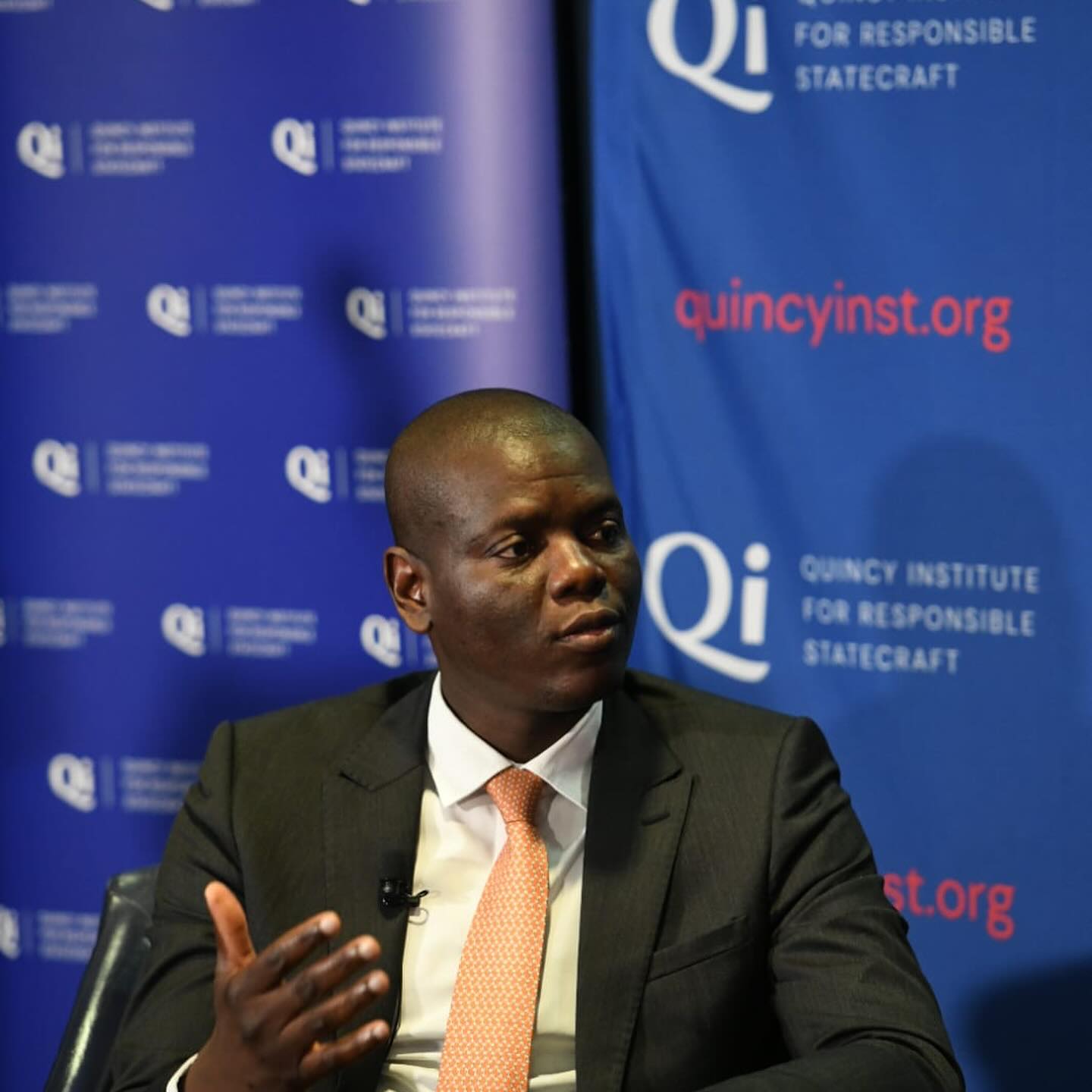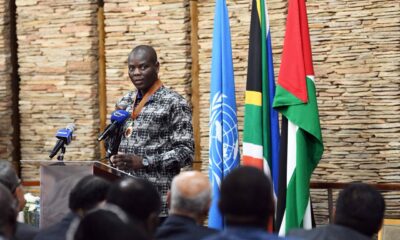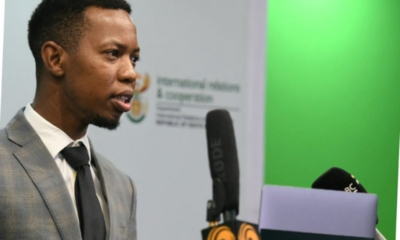
News

Lamola: One step forward, two steps back
On his first official visit to the United States (US), South Africa’s minister of international relations and cooperation, Ronald Lamola, unashamedly reiterated, “We stand with the people of Palestine,” and that he believes Israel is committing genocide.
Lamola arrived for his weeklong trip to the US on Thursday, 12 September, just days after the African National Congress (ANC) in the Western Cape came out in full support of Hamas.
In an interesting turn, Lamola also told the Congressional Black Caucus Foundation’s 53rd Annual Legislative Conference in Washington, D.C., that South Africa “condemns what happened to the people of Israel on 7 October, and we condemn it in the strongest terms. We call for the release of all the hostages.”
That was where his recognition of Israeli human rights ended. “We also said that the state of Israel’s response to the incident of 7 October is disproportionate to the offense committed,” he said. “It’s going beyond self-defence as predicated by international law, and it’s against this background that we went to the International Court of Justice [ICJ].”
The way Lamola opened his speech may mean he is slowly starting to “walk back” South Africa’s one-dimensional approach to Israel, says Hussein Solomon, senior professor in the department of political science at the University of the Free State. He notes that the previous minister, Dr Naledi Pandor, wasn’t likely to have acknowledged Hamas’s atrocities or called for the return of the hostages.
“The ANC finds itself in a very difficult position. It needs to walk back its position because it’s scared,” says Solomon. “There’s that bipartisan bill going through Congress asking to re-evaluate US-South Africa relations. You have South Africa deriving tremendous benefit from the African Growth and Opportunities Act. You have South Africa benefiting from PEPFAR [The US President’s Emergency Plan for AIDS Relief], providing free antiretrovirals to HIV-positive people. You have the US assisting South Africa in numerous other ways. South Africa doesn’t want to lose all of that.
“How are you going to walk back from court proceedings that you started, in which other countries have joined you?” asks Solomon rhetorically. “The ANC cannot lose face, so it’s a process of walking back. Acknowledging what happened on 7 October and condemning it as opposed to justifying it, which was the previous position, is a start. But with a sitting president who said ‘From the river to the sea’ still in office, you cannot expect Lamola to walk back completely. It’s not going to be 180 degrees, but it might be 10 degrees at a time.”
However, the rest of Lamola’s speech was radically anti-Israel. He went on to say, “We continue to call on the global community to stand in solidarity with the people of Palestine and call on Israel to stop the genocide that is currently unfolding. We will continue to do so, despite threats that come from across the globe, because we believe we are standing on principles.”
Talking to an audience which included US legislators, he said, “We continue to champion human rights in Gaza. This has been a historic position of the South African government.” He said the court had indicated that Israel “should cease its military operations, cease the destruction of infrastructure, but despite the court’s ruling, Israel continues to do so”.
He acknowledged “differences of opinion” with the US, but called for engagement “on the basis of constructive dialogue”. Both countries benefited from the relationship, Lamola said. “Let us engage on differences, but we may agree to disagree. We will not tell the US what to do, and we expect the US not to tell us what to do.”
Among other engagements, Lamola was hosted by the controversial Quincy Institute for Responsible State Craft. According to Leon Hadar, former research fellow in foreign policy studies at the Cato Institute and the author of Sandstorm: Policy Failure in the Middle East, the Quincy Institute “routinely vilifies supporters of Israel in Washington. Its principal goal is to reorient American policy in the Middle East, marginalising America’s two leading allies, Israel and Saudi Arabia, while promoting Iran as a future regional hegemon.”
At that event, Lamola pushed the point that Israel was committing genocide. He said the reason South Africa went to the ICJ was because all other options had failed. He said he believed there should be an arms embargo to Israel because sending arms “fuels the conflict”.
He denied that South Africa was put under financial pressure from Iran to take Israel to the ICJ. “We feel no pressure from Iran financially, physically, or in any other form. Trade between South Africa and Iran is very low, so there cannot be financial pressure.”
Local political analyst Steven Gruzd says he didn’t expect Lamola to veer from his script of supporting the Palestinians, even when speaking to a US audience. Even in a government of national unity, “all the important positions in the department of international relations and cooperation are still in the hands of the ANC,” he says.
“So, while there might be a moderation of tone, in terms of substance, we’re not going to see any radical changes in the stances that South Africa has taken on the international stage, including on the Palestinians.
“South Africa is given quite a lot of leeway on the international stage, and perhaps gets away with more than it should,” he says. “This is because of its relative size, its importance in the southern African region, and on the African continent. America doesn’t want to make an enemy out of South Africa. But I do think that the string of actions that have been taken in the past year in regard to both Russia and Israel have strained relations, like the Lady R incident and the ICJ case. A lot depends on what happens in November [the American elections].”
South African Jewish Board of Deputies (SAJBD) National Director Wendy Kahn says the SAJBD is disappointed that “once, again the South African government has missed an opportunity to play a constructive role in ending this very painful war. The ANC has chosen to side with Hamas, as exemplified by government’s failure to condemn the execution of six Israeli hostages three weeks ago. This unfortunate stance is clear evidence that the South African government is continuing to depart from its stated principles of conflict resolution.”
Rolene Marks, the spokesperson for the South African Zionist Federation, says, “Minister Lamola makes claims that, as a lawyer and former minister of justice, he should know are untrue. The ICJ hasn’t found Israel guilty of genocide, and it’s outrageous for the South African government to continue spreading this falsehood both in South Africa and the US.
“South Africa is likely to struggle to prove its ICJ case when it files its papers next month,” says Marks. “This is because Israel isn’t committing genocide but defending itself against terrorist group Hamas. Additionally, South Africa remains hypocritically silent on human rights abuses elsewhere in the world, particularly in Africa. If South Africa were truly concerned about genocide, it would focus on places where there is credible evidence of such.”











Gary
September 19, 2024 at 6:41 pm
Israel is hated by the most the world for fighting for survival, and there being a relatively high casualty count on the other side, Massive atrocities like those in Iran, Russia, Ukraine, Congo. Sudan Afghanistan, China, Zimbabwe, the list gos on elicit total indifference though except in the countries where they taking place?
yitzchak
September 20, 2024 at 8:46 am
HOW WILL HE EXPLAIN THE 5 day TRIP BY vICE aDMIRAL lUBISI’S WITH A DELEGATION FROM THE sa NAVY TO iRAN ON AN OFFICIAL NAVAL DELEGATION? IN aUGUST
Questions: Why was Nasrallah not carrying his pager in his pocket???
Do the roosters inLebanon still go cock-a- doodle-do?
Deborah Greene
December 2, 2024 at 11:14 pm
Ronald Lamola is not only Stupid but QUITE Ignorant. To say the Palestinians innocent…does he not know who started this war? That’s kinda of saying ..i vote black people just because im black!!!so we don’t care about Democracy. Absolute Nonsensical. ANC has lost her ICC and the UN Circus case against ISRAEL before it begins